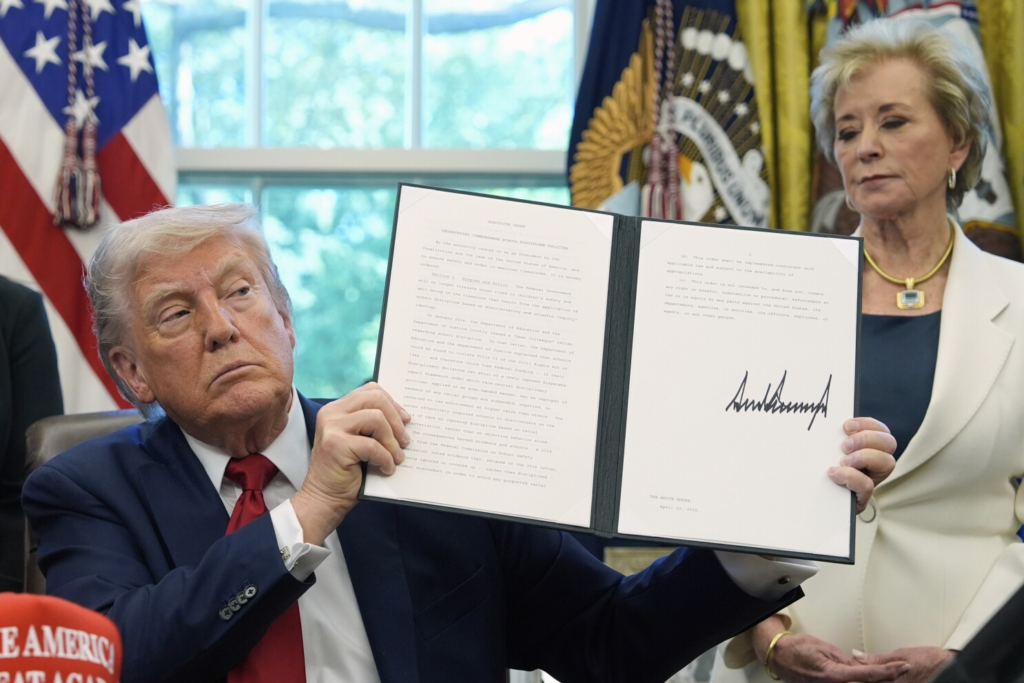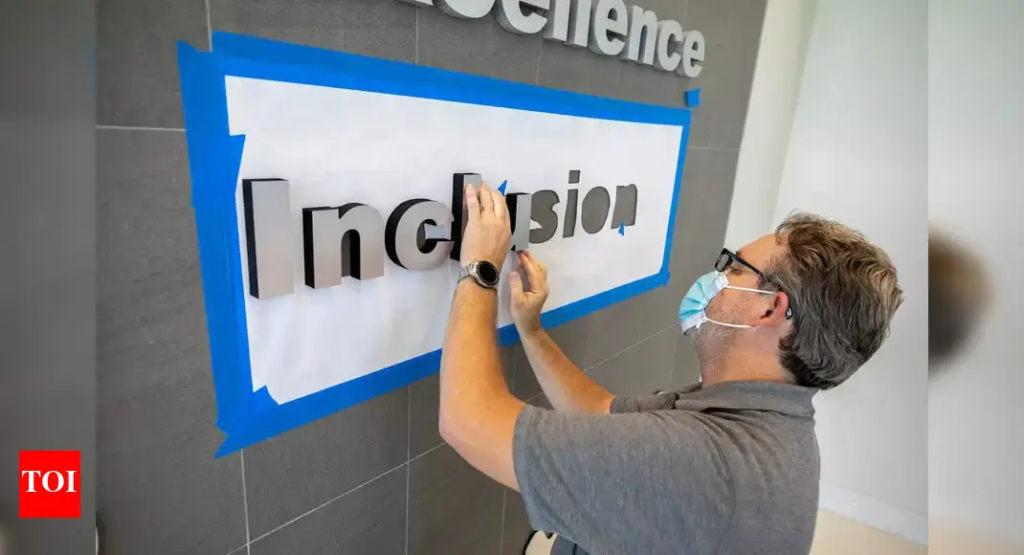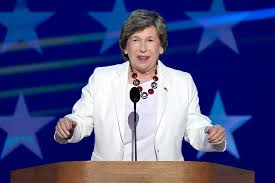In a significant development in the ongoing debate over education policy, a major teachers union in the United States has filed School a lawsuit challenging a Trump administration memo that seeks to eliminate what it describes as “race-based” programs in public schools. The legal action, initiated in early 2025, has sparked widespread discussion about the role of diversity, equity, and inclusion (DEI) initiatives in education and the broader implications for federal policy under the current administration. This article explores the details of the lawsuit, the memo’s intent, the arguments on both sides, and what this could mean for schools across the country.

Background of the Controversy
The Trump administration issued a memo in January 2025, directing the Department of Education to halt funding and support for programs it labeled as “race-based.” According to the memo, these programs include initiatives that prioritize racial equity, such as teacher training on implicit bias, diversity-focused curriculum development, and affirmative action policies in school admissions or hiring. The administration argues that such programs promote division and violate principles of equal treatment under the law, citing Title VI of the Civil Rights Act of 1964, which prohibits discrimination based on race, color, or national origin in programs receiving federal funding.
The memo has drawn sharp criticism from educators, civil rights advocates, and unions, who argue that it mischaracterizes efforts to address systemic inequalities in education. The National Education Association (NEA), one of the largest teachers unions in the U.S., filed a federal lawsuit in February 2025 to block the memo’s implementation, claiming it undermines decades of progress toward equitable education and infringes on schools’ ability to address disparities faced by marginalized students.
The Lawsuit: What the Teachers Union Argues
The NEA’s lawsuit, filed in a federal district court, contends that the Trump administration’s memo is both legally flawed and harmful to students. The union argues that the memo misinterprets Title VI, asserting that programs aimed at addressing racial disparities do not inherently discriminate against any group but instead seek to level the playing field for students of color who face systemic barriers. The lawsuit cites data showing persistent achievement gaps between white students and students of color, as well as disparities in school discipline, access to advanced coursework, and teacher diversity.
The NEA claims that the memo’s broad language could dismantle critical programs, such as those providing targeted support for Black and Hispanic students in underfunded schools or professional development for teachers to better serve diverse classrooms. The union also argues that the memo violates the Administrative Procedure Act, as it was issued without proper public comment or review, making it an overreach of executive authority. “This memo threatens to roll back efforts to ensure every student has a fair shot at success,” said NEA President Becky Pringle in a press statement. “We’re fighting to protect the rights of educators and students to create inclusive schools.” [https://www.nea.org/advocating-for-change/new-from-nea/nea-sues-trump-admin-memo]
The Administration’s Position
The Trump administration defends the memo as a necessary step to ensure fairness and neutrality in education. In public statements, administration officials have argued that programs emphasizing race foster division and undermine merit-based systems. They point to examples of initiatives they claim prioritize certain racial groups over others, such as scholarships or mentorship programs exclusively for minority students. The memo aligns with broader efforts by the administration to curb what it views as excessive focus on race in public policy, including similar actions targeting DEI programs in federal agencies and workplaces.
Supporters of the memo, including conservative advocacy groups, argue that it protects students from being judged or treated differently based on their race. They cite legal precedents, such as the 2003 Supreme Court case Grutter v. Bollinger, which upheld affirmative action but emphasized that race-neutral alternatives should be considered when possible. The administration contends that schools can address disparities without relying on what it calls “race-based” solutions, such as by focusing on socioeconomic status or universal academic support programs. [https://www.ed.gov/news/press-releases/trump-admin-memo-race-based-programs]

The Broader Debate: Equity vs. Equality
The lawsuit has reignited a national conversation about the distinction between equity and equality in education. Equity-focused programs aim to provide tailored support to groups that have historically faced disadvantages, such as Black, Hispanic, and Native American students, who often attend schools with fewer resources, less experienced teachers, and higher rates of disciplinary action. Critics of the Trump administration’s memo argue that eliminating these programs ignores the reality of structural inequalities and could widen existing gaps in educational outcomes.
For example, a 2023 report from the National Center for Education Statistics found that Black students were suspended at three times the rate of white students for similar infractions, and Hispanic students were less likely to have access to advanced placement courses. Advocates for DEI programs argue that initiatives like culturally responsive teaching and bias training for educators are essential to addressing these disparities. Without them, they warn, schools risk perpetuating cycles of disadvantage.
On the other hand, proponents of the memo argue that focusing on race in education policy can inadvertently reinforce stereotypes and create resentment among students and families. They advocate for race-neutral approaches, such as increasing funding for all low-income schools or expanding access to tutoring for struggling students, regardless of race. This perspective aligns with a growing push among some policymakers to shift away from race-based frameworks toward class-based or universal solutions.
Implications for Schools and Students
If the NEA’s lawsuit succeeds, the memo could be struck down or delayed, allowing schools to continue implementing DEI programs without fear of losing federal funding. However, if the memo is upheld, schools may face significant challenges in maintaining initiatives that address racial disparities. For instance, districts could lose grants for programs like teacher diversity pipelines or mentorship for underrepresented students. Smaller districts with limited budgets may struggle to replace these funds, potentially leading to cuts in support services.
Teachers, too, could feel the impact. Many educators rely on professional development programs to learn how to create inclusive classrooms or address unconscious bias. Without these resources, some worry that they will be less equipped to meet the needs of diverse student populations. “I teach in a school where most of my students are Black and Latino,” said Maria Gonzalez, a high school teacher in Chicago. “The training I’ve received on cultural competency helps me connect with them and understand their challenges. If those programs go away, it’s the kids who lose out.”
Public Reaction and Political Context
The lawsuit has drawn attention from both sides of the political spectrum, reflecting the polarized nature of education policy in the U.S. Progressive groups, including civil rights organizations, have rallied behind the NEA, framing the lawsuit as a defense of justice and equality in schools. Meanwhile, conservative commentators have praised the Trump administration’s memo as a bold move to prioritize fairness and unity. Posts trending on X highlight the divide, with some users calling the memo a “common-sense reform” and others labeling it an attack on efforts to dismantle systemic racism. [https://www.nytimes.com/2025/02/15/us/education-teachers-union-trump-memo.html]
The timing of the lawsuit is notable, as it comes amid a broader push by the Trump administration to reshape federal education policy. Recent moves include proposals to expand school choice and reduce the role of the Department of Education, signaling a shift toward less federal oversight in schools. The outcome of this lawsuit could set a precedent for how far the administration can go in altering existing policies without legislative approval.

What’s Next?
The federal court is expected to hear arguments in the NEA’s lawsuit in the coming months, with a ruling potentially impacting the 2025-2026 school year. Legal experts predict a contentious battle, as the case raises complex questions about federal authority, civil rights law, and the balance between equity and equality. If the case escalates to higher courts, it could reach the Supreme Court, where recent rulings on affirmative action suggest a skeptical view of race-conscious policies.
For now, educators, parents, and students are watching closely. The outcome of this lawsuit could shape the future of diversity and inclusion in American schools, determining whether programs designed to address racial disparities can continue or if a new, race-neutral approach will take their place. As the debate unfolds, one thing is clear: the fight over education policy is far from over, and its consequences will be felt by generations of students.
Best Article :- Consumer Confidence Reaches New Heights in 2025 as Americans Feel Optimistic About the Future






